Deleuze and the Humanities
Continental Philosophy in Austral-Asia
Series editors:
Simone Bignall, Senior Lecturer, Indigenous Strategy and Engagement, Flinders University
P. Diego Bubbio, Senior Research Fellow in Philosophy, University of Western Sydney
Joanne Faulkner, Lecturer in Philosophy and Womens and Gender Studies, University of New South Wales
Paul Patton, Scientia Professor, University of New South Wales
The Continental Philosophy in Austral-Asia series transports a tradition of thought understood as belonging to one place the continent to places that were transformed in its image through colonization: Australia, New Zealand, East Asia and South Asia. The series aims to explore and showcase the diverse ways in which European philosophy has been interpreted and put to use according to the contexts and questions particular to life in even further, stranger and more exotic continents.
Titles in the Series
Young and Free: [Post]colonial Ontologies of Childhood, Memory and History in Australia by Joanne Faulkner
The Phenomenology of Gravidity: Reframing the Maternal in Merleau-Ponty, Levinas and Derrida by Jane Lymer
Deleuze and the Humanities: East and West, edited by Rosi Braidotti, Kin Yuen Wong and Amy Kit-sze Chan
Unsettling Food Politics: Agriculture, Dispossession and Sovereignty in Australia, by Christopher Mayes (forthcoming)
Published by Rowman & Littlefield International Ltd
Unit A, Whitacre Mews, 2634 Stannary Street, London SE11 4AB
www.rowmaninternational.com
Rowman & Littlefield International Ltd. is an affiliate of Rowman & Littlefield
4501 Forbes Boulevard, Suite 200, Lanham, Maryland, 20706, USA
With additional offices in Boulder, New York, Toronto (Canada), and Plymouth (UK)
www.rowman.com
Selection and editorial matter 2018 Rosi Braidotti, Kin Yuen Wong and Amy Kit-sze Chan
Copyright in individual chapters is held by the respective chapter authors.
All rights reserved. No part of this book may be reproduced in any form or by any electronic or mechanical means, including information storage and retrieval systems, without written permission from the publisher, except by a reviewer who may quote passages in a review.
British Library Cataloguing in Publication Data
A catalogue record for this book is available from the British Library
ISBN: HB 978-1-7866-0600-6
Library of Congress Cataloging-in-Publication Data
Names: Braidotti, Rosi, editor.
Title: Deleuze and the humanities : east and west / edited by Rosi Braidotti, Kin Yuen Wong, and Amy K.S. Chan.
Description: Lanham : Rowman & Littlefield International, 2018. Series: Continental philosophy in Austral-Asia | Includes bibliographical references and index.
Identifiers: LCCN 2017058509 (print) | LCCN 2017060851 (ebook) ISBN 9781786606013 (Electronic) | ISBN 9781786606006 (cloth : alk. paper)
Subjects: LCSH: Deleuze, Gilles, 19251995. | Humanities. | Humanism.
Classification: LCC B2430.D454 (ebook) | LCC B2430.D454 D4573 2018 (print) DDC 194dc23
LC record available at https://lccn.loc.gov/2017058509
 The paper used in this publication meets the minimum requirements of American National Standard for Information Sciences Permanence of Paper for Printed Library Materials, ANSI/NISO Z39.481992.
The paper used in this publication meets the minimum requirements of American National Standard for Information Sciences Permanence of Paper for Printed Library Materials, ANSI/NISO Z39.481992.
Printed in the United States of America
Chapter-by-Chapter Synopsis
- Introduction Rosi Braidotti, Amy Kit-sze Chan and Kin Yuen Wong
- Defamiliarization and the Act of Reading World Literature, Grant Hamilton
In her recent book on the posthuman, Rosi Braidotti briefly outlines a confronting new critical theory by which a new humanities could emerge. First is the nod towards ethical accountability, and then an overwhelming privileging of trans-disciplinarity. Next is the imperative of bringing together critique and creativity, the championing of non-linearity and the associated sites of memory and the imagination. The last feature of Braidottis new critical theory emphasizes the productive act of defamiliarization. Of these, this chapter concerns itself with the notion of defamiliarization.
This chapter argues that the most productive aspect of world literature is captured in those moments when the reader finds himself or herself unable to draw on his or her own experience (literary or otherwise) in order to maintain the fiction of meaning in a text. Drawing on the work of Deleuze, this chapter reads such an interruption to the process of meaning-making (such explicit defamiliarization) as a kind of stuttering. However, and importantly, it is this stuttering that leads to an unanticipated and undirected becoming. Because of this, far from being a negative state, defamiliarization is shown to be the genesis of the new new understanding, new perspectives and new ideas.
- 3.Transversally Yours: Deleuzian Love and Taoist Qing, Sebastian Hsien-Hao Liao
Love in Deleuze is an important, but under-discussed, concept. Recent discussions have broken ground by connecting it with the encounter with the otherwise Other, which expresses a possible world. It is through breaking up the stabilized identity, the boundaries between subject and object established by the Western philosophical tradition, that love occurs and provides the possibility of creation and novelty. The ethical implications of Deleuzian love include, among other things, the configuration of a relationality that is alternatively called transversal ethics, an ethics that connects while fully respecting differences. The distinction between the human and non-human forms of love compares interestingly and fruitfully with the Taoist concept of qing or feeling, which also distinguishes between the human qing and the non-human or transhuman Tao qing. In both the Deleuzian and Taoist systems, the non-human or transhuman form of love (or schizo love) belies the naturalness and stability of human consciousness and its accompanying values and allows access to an ontological truth, often called Life by Deleuze, that features flow and change and thereby facilitates deeper connections between individuals (rather than subjects). Hence, Deleuzes remark: Love is life itself. In a word, the non-human or transhuman form of love ensures constant becoming of the individual and enables others (animate as well as inanimate) to become and thereby manifests a transversal ethics that goes beyond the phenomenological affective turn that still clings to the notion of intersubjectivity.
- 4.Deleuze and Ikeda: Two Concepts of Revolution, Tony See
Deleuze is known for resisting the traditional image of the subject as a fixed substance in favour of a subject that is merely the provisional outcome of a process of subjectivation. Instead of a unitary and unchanging subject, there is an assemblage of heterogeneous and changing elements that is always under construction. In Empiricism and Subjectivity, Deleuze explains that this subject arises from the twin processes of an intensive, integrative act of our practical interest, together with the associative rules of our speculative interest (Boundas 2005: 268). This subject in turn gives rise to fictitious things such as God and the world with valorizes a transcendence which now negates its own immanent powers. Thus, Claire Colebrook has suggested that although it has become commonplace to see the world as being constructed by an isolated subject, the fact is that the idea of an isolated subject is just one more form of transcendence (Colebrook 2002: 73). Although Deleuzes theory of subjectivity has been discussed at length in contemporary Deleuze scholarship, relatively little has been focused on its relationship with theoretical constructions of the subject in the philosophical traditions of Asia. This gives us much food for thought as Deleuzes theory of subject has resonances with notions of subjectivity in Buddhist phenomenology, one which denies a permanent substance in favour of a becoming subject that is representation-only (

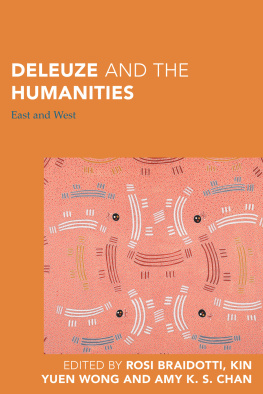
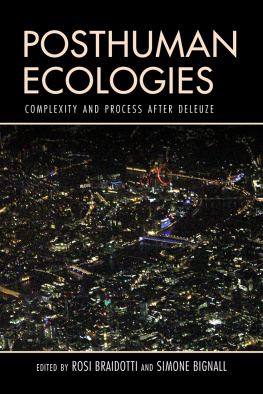

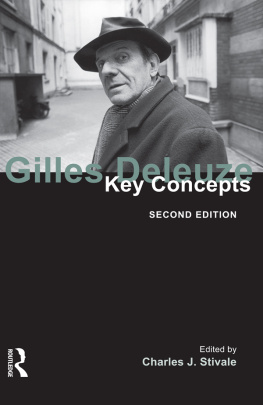
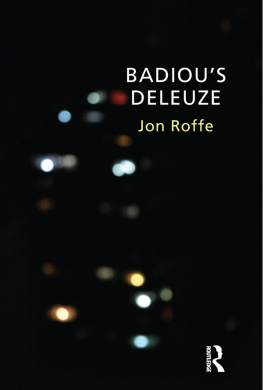
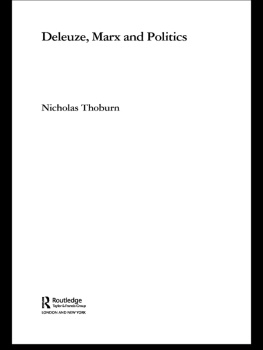
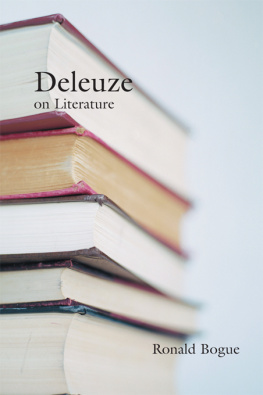
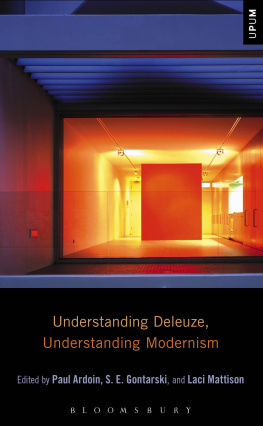
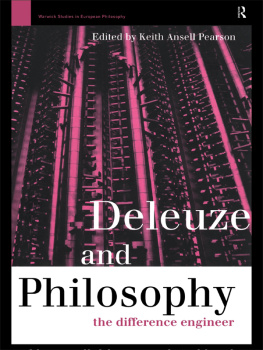
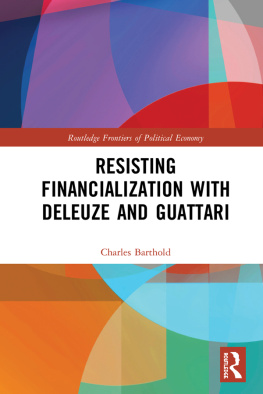
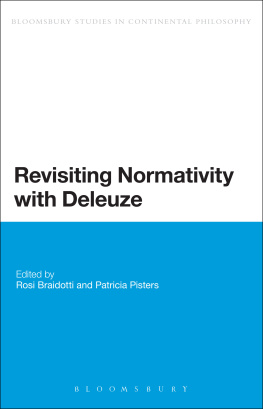
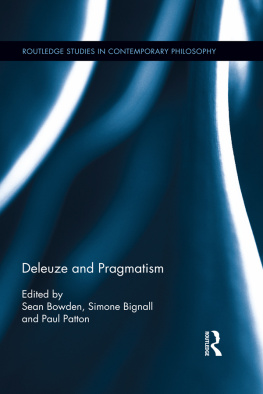
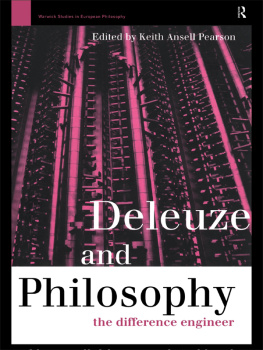


 The paper used in this publication meets the minimum requirements of American National Standard for Information Sciences Permanence of Paper for Printed Library Materials, ANSI/NISO Z39.481992.
The paper used in this publication meets the minimum requirements of American National Standard for Information Sciences Permanence of Paper for Printed Library Materials, ANSI/NISO Z39.481992.